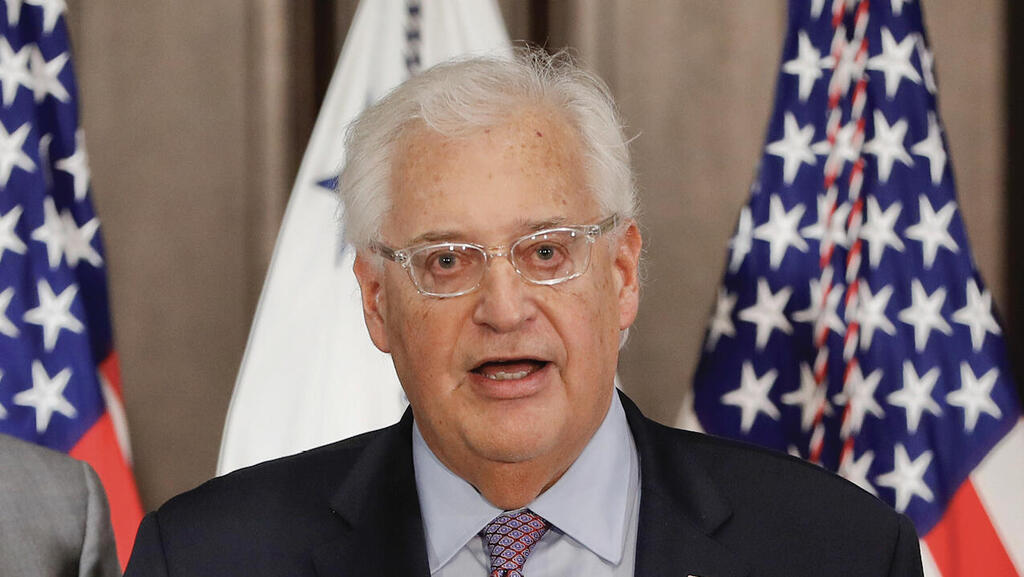I attended the latest MEAD conference last week in Washington (full disclosure, I was invited as a bipartisan participant as were all participants). Also there was former U.S. ambassador to Israel under Trump, David Friedman, published his new book, "One Jewish State," in which he advocates for Israeli sovereignty over the West Bank.
As he explained to me while we both waited for smoked salmon, “From the Jordan River to the sea, Israel will be free.” Friedman is mentioned as a candidate for U.S. ambassador to Israel again, signaling a potential direction for the next administration. Meanwhile, on stage, U.S. Secretary of State Antony Blinken repeatedly referred to Gaza’s notorious terrorist leader as "Mr. Sinwar."
A senior official in the Biden-Harris administration said that the assassination of Hamas leader Ismail Haniyeh in Tehran had “seriously disrupted” efforts to stabilize the region. Later, former Trump Secretary of State Mike Pompeo took the stage, surprising the audience in two ways: his drastic 30-pound weight loss and his explicit support for Israeli action against Iran. Pompeo laid out two potential U.S. responses to an Israeli strike: “Either the U.S. tells Israel not to dare, or we say, ‘Go for it.’ The Biden administration will claim it’ll lead to World War III, while a Trump administration will provide the needed support – and even more.”
Pompeo, who has a wine named after him at a vineyard in the West Bank, asserted that Israel must decisively win in Gaza and forge a security agreement “fundamentally different from what’s been in place since the early 2000s. The Israeli people are suffering, while all the president and his vice president can talk about is a cease-fire.”
Americans must decide for themselves whom they prefer. There are compelling arguments for both sides. Trump is a narcissist who views the law as pliable, while Harris is an opportunist with an ideology as malleable as slime. His party has far-right extremists, and hers harbors antisemitic elements.
For most Israelis, however, who are not burdened by issues like abortion, borders or January 6, the choice seems fairly clear. I sense that a strong majority of Middle Eastern attendees at the conference secretly hope for this outcome.
Yes, the Republican candidate will be unpredictable, like all his predecessors in a second term, with an added Trump factor. But the problem is that Harris is all too predictable. There has indeed been a shift in the administration’s stance in recent months. A strong warning from the U.S. president, conveyed via Switzerland, was the reason for Iran backing down from its revenge threats over Haniyeh’s assassination. But with a party that includes Hamas sympathizers and an administration that champions appeasement, expectations should remain low.
Even in this context, Blinken’s attempt at humor on stage, quoting the late Senator John McCain, didn’t quite land: “It’s always darkest before it goes completely black.”
Meanwhile, senior Israeli officials who visited the White House this week reported a gloomy atmosphere in the corridors. Like the month before moving houses – no boxes packed yet, but the sense of impermanence is in the air. After a brief surge of excitement following the Biden-Harris job swap, a sugar crash has set in.
The Democratic campaign – wisely – has focused on energy over substance. The fragile Democratic coalition that brought Biden to the presidency is fraying over immigration, Gaza and the economy. Harris, hardly a model of ideological consistency in the mold of Shulamit Aloni, hoped to bridge these gaps with momentum, sharp digs at Trump, and her trademark hearty laugh.
It worked for a while. Half the campaign was over before it became clear that maybe it wasn’t enough. Oddly, policy is Trump’s strength, while personal attacks are Harris’ most effective weapon. Harris, who has repeatedly dodged interviews on substantive issues, hopes to ride the wave of her campaign’s precise jabs at Trump. Meanwhile, Trump, after weeks of floundering, finally found his message: Kamala is a communist, and her illegal immigrants will destroy America.
This week’s debate showed it’s too soon to start packing at the White House. Trump, the candidate who lost more debates than anyone in U.S. history (with his one win in June being a Pyrrhic victory), looked a bit like yesterday’s man. Harris, meanwhile, exemplified the saying that when expectations are lowered to zero, you can dazzle the world with mediocre performance. Next to her predecessor, who seemed to be live-demonstrating dementia, she shone. No, this wasn’t the kind of debate that decides elections, but it could have been had Trump convincingly won – and he didn’t.
 Amit Segal
Amit SegalTrump’s main enemy remains himself. If he could control his tongue, refrain from personal attacks and avoid the lost cause of defending his refusal to concede in 2020, the election might already be behind us. His best political months were last spring when a court order prohibited him from commenting on the criminal cases pending against him. Suddenly, the former president sounded focused, sharp and solution-oriented. But that’s the thing with a candidate who can only be disciplined under the threat of jail.




